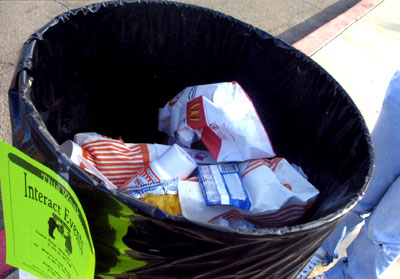All Nonfiction
- Bullying
- Books
- Academic
- Author Interviews
- Celebrity interviews
- College Articles
- College Essays
- Educator of the Year
- Heroes
- Interviews
- Memoir
- Personal Experience
- Sports
- Travel & Culture
All Opinions
- Bullying
- Current Events / Politics
- Discrimination
- Drugs / Alcohol / Smoking
- Entertainment / Celebrities
- Environment
- Love / Relationships
- Movies / Music / TV
- Pop Culture / Trends
- School / College
- Social Issues / Civics
- Spirituality / Religion
- Sports / Hobbies
All Hot Topics
- Bullying
- Community Service
- Environment
- Health
- Letters to the Editor
- Pride & Prejudice
- What Matters
- Back
Summer Guide
- Program Links
- Program Reviews
- Back
College Guide
- College Links
- College Reviews
- College Essays
- College Articles
- Back
Waste Pollution
Waste pollution is a growing problem in our present society. The government has been attempting to stabilize the pollution, but it only slows down its growth. From 2000 to 2015, our global plastic waste has more than doubled in size from 3 billion tons to 7.8 billion tons. The U.S. has implemented laws and acts such as the Pollution Prevention Act and P2, but it doesn’t stop or diminish the pollution problem. Waste continues to increase as the population increases, as well as big industries.
The current method of ridding of solid wastes are very flawed and are contributing to environmental damage and also contamination of the areas they are located near. The gases that are released from the burning of waste cause unhealthy fumes to be released into the atmosphere and fill our community with harmful toxins. The landfills processes are currently our main source of waste removal, but in doing so, it is causing many side effects that are damaging our communities and surrounding areas. The toxins that are released into the air can cause infectious diseases that risk exposure, eye infection, blood infection, skin infection, and respiratory infection. In the article, Health Impacts of Solid Waste, it states “Exposure to hazardous waste can affect human health, children being more vulnerable to these pollutants. In fact, direct exposure can lead to diseases through chemical exposure as the release of chemical waste into the environment leads to chemical poisoning. Many studies have been carried out in various parts of the world to establish a connection between health and hazardous waste.” Our waste management needs to be changed before living conditions near these areas become deadly. More regulations and new processes that can limit the amount of fumes and chemicals being released from the landfills must be made to stop the harming of our environment and communities. The U.S. needs to move towards a system based off of recycling and implement laws banning the disposal of recyclable materials, to ensure the proper treatment of our waste.
A majority of the waste produced in the world is plastic. We humans created plastic, and we now use plastic for almost everything in our daily lives. With the implication of plastic into society, waste levels have drastically risen, polluting the oceans and wildlife areas. The U.S. government has no national law that enforces recycling, making it possible for littering and pollution of our environment. Some states in the U.S. have stricter laws than others, but a majority take recycling very lightly. The U.S. needs to become more attentive to the pollution that is harming our environment, and take initiative to prevent and punish people that litter. Programs such as the EPA help to the U.S’s environment from hazardous substances and pollutants that could hurt the environment. Although the EPA has a strong program to prevent large scale pollutants from damaging the environment, it isn’t enough to reduce pollution.
People in communities need to become more proactive about what is going on in our world and lives. Waste pollution affects everyone, no matter where they live. The government isn’t the only ones that can help with the reduction of waste pollution. Everyone has a part in the fight against waste pollution. Therefore, people need to learn how to reduce the amount of waste they produce and environmentally friendly options. If more and more people become aware of this problem and take action, the world can be well on their way to cleaning up the environment of the waste. If we don’t start taking action now, we may not have a world to save later on in the future.
Waste reduction can be hard to reduce/prevent if acted on alone, but with the help of the communities, waste pollution can be reduced to nothing. In order to prevent more waste from entering the environment, people need to limit the amount of materials they use and throw away. Reducing the amount of materials people use such as boxes, bags, bottles, etc, it will decrease the amount of waste that need to be processed. Buying bulk and reusable items such as bottles and bags, instead of packaged plastic bottles. Reusing furniture and supplies can help reduce the necessary materials to make a new item. There are many ways to help out with waste pollution, but it can only begin with the help of the people. Waste pollution is a fast growing epidemic that is only worsening. Take initiative in the fight against waste pollution and start reducing waste today.

Similar Articles
JOIN THE DISCUSSION
This article has 0 comments.

This piece is very important in the changing of our damaged earth. We need to advocate for this worldwide problem before it gets out of hand.